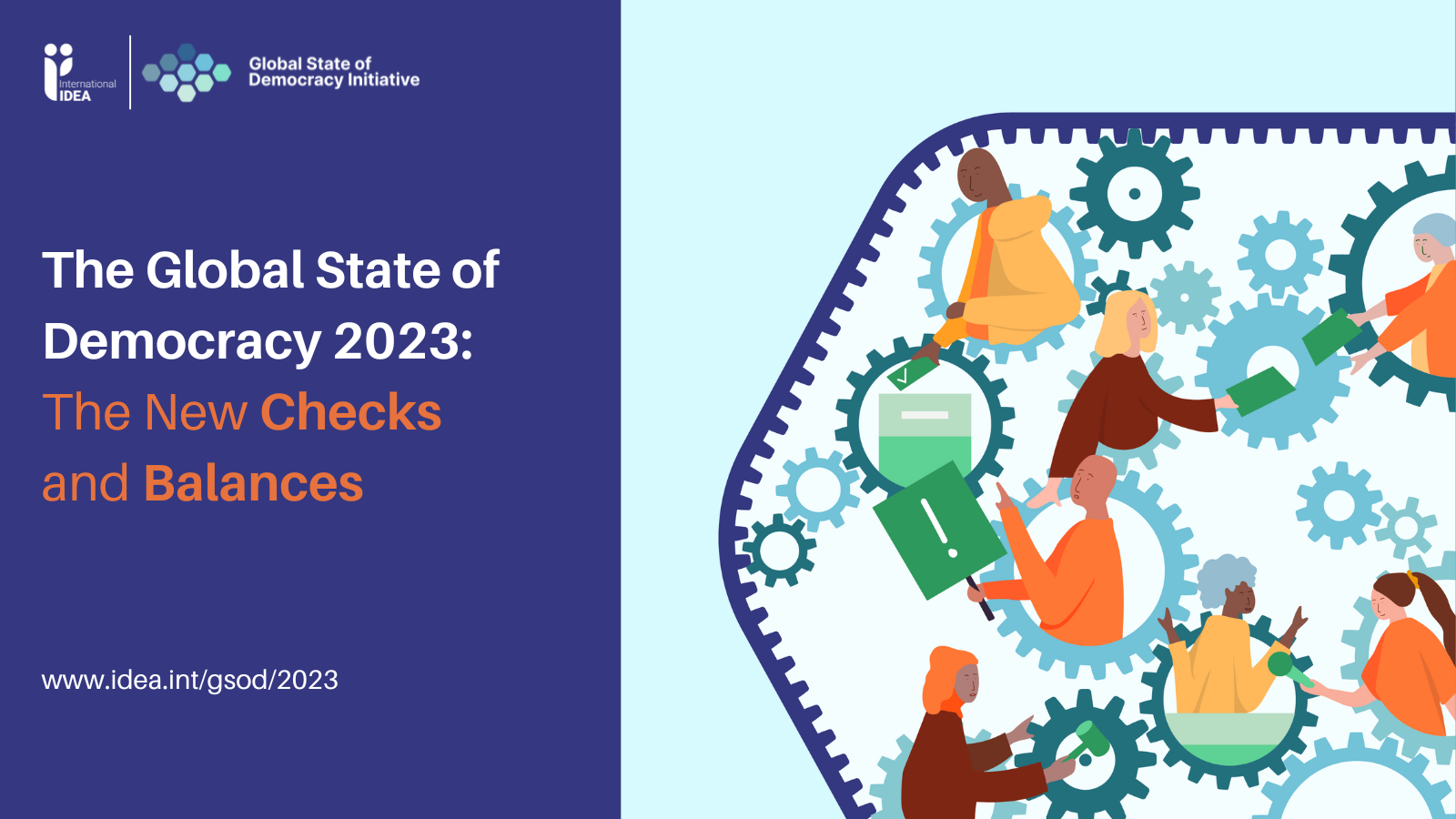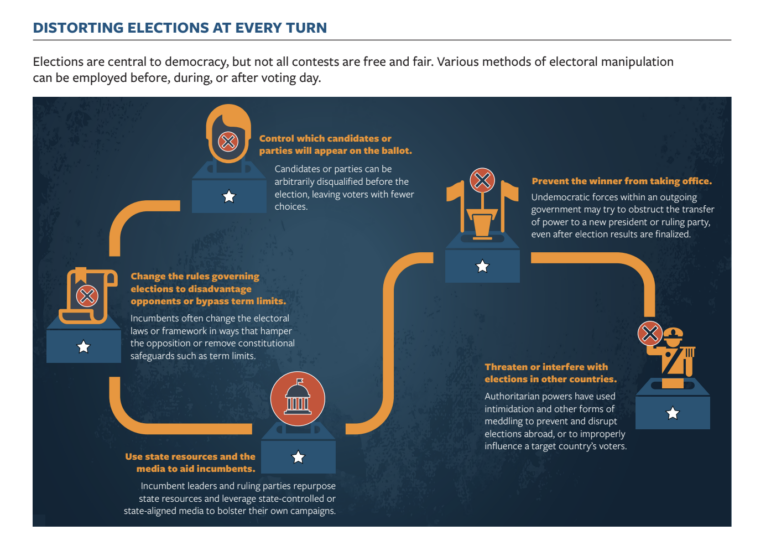Press freedom serves as a watchdog on government power, enhancing transparency and accountability. It ensures citizens receive unbiased information, critical for informed decision-making and democratic participation.
Freedom of the press is a crucial pillar of democracy, providing a platform for discourse and opinion sharing. This access to information enables the electorate to scrutinize the actions of their government, fostering a climate where officials must operate with integrity and responsibility.
The media’s role in investigating and reporting can deter corruption, bringing to light issues that may otherwise go unchecked. It is the press that often catalyzes the enforcement of checks and balances by informing the public and stimulating civic engagement. Clear and reliable reporting generates a more informed society, necessary for the effective functioning of a balanced and fair government system.
The Pillars Of Democracy
The Pillars of Democracy stand tall as a testament to values that enable a society to thrive. At the heart of these pillars lies the freedom of the press. This liberty is not just a right but a tool. It maintains a balance within the government. It ensures all voices get heard.
Press Freedom As A Democratic Cornerstone
Democracies rely on informed citizens to make wise decisions. Press freedom guarantees that information. It empowers people with knowledge. Journalists uncover truths. They share crucial insights. This flow of information is vital. Without it, democracy weakens. Citizens must have access to diverse views. It helps them vote with confidence. They can stand up for what matters to them.
Separation Of Powers And Accountability
The separation of powers is a system’s safeguard. Each government branch has roles. These roles must not get muddled. Press freedom shines a light on any overreach. Journalists hold leaders to account. They scrutinize decisions. This prompts officials to act right. Fear of exposure deters corruption. A transparent government is a fair one. The role of the press is undeniable. It keeps a watchful eye.
Historical Milestones In Press Freedom
The freedom of the press stands as a cornerstone of democracy. As the watchdog of the government, the press holds leaders accountable. It sheds light on misdeeds and praises good deeds. Throughout history, the press has achieved many victories. These milestones mark the progress in the ongoing struggle for press freedom. They guide its crucial role in maintaining checks and balances.
Early Instances Of Free Press
The concept of a free press is not modern. It dates back centuries. Gutenberg’s printing press in the 15th century opened doors to mass communication. Ideas and knowledge spread faster than ever. This power was not taken lightly by authorities.
- 1644: Areopagitica – A pamphlet by John Milton argues for unlicensed printing.
- 1695: End of Licensing Order – England no longer requires government permission to publish.
- 1735: John Peter Zenger Trial – Legal victory for press freedom in the American colonies.
Landmark Legal Cases And Legislation
Legal battles shaped press freedom. Courts and lawmakers defined its limits and protections.
| Year | Case/Legislation | Impact |
|---|---|---|
| 1786 | Virginia Declaration of Rights | Inspires the First Amendment. |
| 1791 | First Amendment – U.S. Constitution | Guarantees press freedom. |
| 1964 | New York Times Co. v. Sullivan | Strengthens protections against libel. |
| 1971 | Pentagon Papers | Supports the right to publish classified information. |
Each legal case reaffirmed the press’s role. The law continues to evolve. It helps sustain a transparent and fair governance system.
Evaluating Press Freedom Indices
Evaluating Press Freedom Indices is essential for understanding the interpersonal play between the media and government. These indices assess how free and independent the press is in different countries. The role of the media as a watchdog hinges on this freedom to investigate, report without fear and hold leaders accountable. A robust press ensures transparency and helps with governmental checks and balances.
Criteria For Ranking Countries
Press freedom indices use several criteria to rank countries:
- Legal framework concerning the press
- Safety and independence of journalists
- Censorship levels and access to information
- Media ownership structures, both government and private
- Regulatory measures impacting the media
Case Studies: Press Freedom Around The World
Differences in press freedom become clear through case studies.
| Country | Press Freedom Status | Notable Points |
|---|---|---|
| Norway | Free | Minimal government interference, safe environment for journalists |
| Eritrea | Not Free | Strict censorship, government control over media |
| Brazil | Partly Free | Media ownership concentration, violence against journalists |
From the open landscapes of Norway to the tightly controlled media in Eritrea, these studies show the range of press freedom. Understanding these differences informs us about the health of a democracy.

Credit: freedomhouse.org
Challenges To Press Freedom
Freedom of the press stands as a pillar of democracy. It ensures governments remain transparent and accountable.
Yet, numerous challenges threaten this freedom.
Let’s explore how censorship and the digital era affect press freedom.
Censorship And Government Control
Governments may exert control to sway public perception.
Censorship silences critical voices and hides truths.
A free press spotlights abuse and corruption.
Without it, power goes unchecked.
- Media blackouts obscure events.
- Propaganda misleads citizens.
- Laws limit reporting.
Digital Era: New Threats And Opportunities
The internet brought innovation to media. It also presented new challenges.
Cyberattacks and misinformation plague digital platforms.
Yet, these platforms also encourage transparency and global connections.
| Threats | Opportunities |
|---|---|
| Hacking | Instant news sharing |
| Spread of false news | Engagement with readers |
| Data control by corporations | Access to diverse sources |
Wise use of digital tools can empower journalism. Journalists must navigate these waters carefully to maintain a balanced narrative.
The Role Of Journalism In Upholding Democracy
In a thriving democracy, journalism is the beacon of truth and accountability. It acts as a critical observer of governmental power. Without a free press, citizens would remain unaware of their leaders’ decisions and actions. Journalism shines a light on issues often left in the shadows. It informs the public and encourages active participation in governance.
Investigative Journalism Exposing Corruption
Investigative journalism plays a crucial role in democracy. It uncovers truths that hold power to account. These stories often lead to public outcry, policy changes, or even legal action. They are vital in maintaining a transparent and honest government.
- Digs deep into government activity
- Uncovers illegal or unethical actions
- Brings crucial information to the public eye
Media As The Public’s Watchdog
The media serves as a watchdog for the public interest. It ensures leaders uphold their duties and promises. This surveillance is key to a balanced and fair government. The press gives a voice to the voiceless and power to the people. It sparks necessary debate and change. Journalists report on policy impacts, societal needs, and government shortcomings. These are essential to a healthy democracy.
| Function | Impact |
|---|---|
| Monitoring government action | Prevents abuse of power |
| Reporting on social issues | Drives community improvement |
| Highlighting policy effects | Influences lawmaking |

Credit: knightcolumbia.org
Strengthening Press Freedom
Freedom of the press stands as a pillar in maintaining democracy and guarding against unchecked power. A vibrant and independent press shines a light on government actions, fostering a climate of accountability.
Policy Recommendations
For a more robust press freedom, policymakers must enact protective legislation. These policies should shield journalists from intimidation and legal repercussions when acting within their professional domain. A key step involves the establishment of media support funds, designed to promote journalistic endeavors safeguarded from government influence.
- Enact laws ensuring journalists’ protection
- Create media support funds for independent reporting
- Provide tax incentives for media organizations upholding ethical standards
- Mandate transparency in government-media interactions
The Role Of International Organizations
International bodies play a pivotal role in securing press freedom across borders. They offer support to media professionals, lead advocacy, and monitor compliance with international standards.
| Organization | Role |
|---|---|
| UNESCO | Promotes the safety of journalists |
| OSCE | Monitors media development |
| CPJ | Defends press freedom globally |
These organizations also offer training programs to bolster journalists’ capacity to navigate complex environments and uphold ethical standards in their reporting.
- Support journalist safety programs
- Engage in advocacy and awareness campaigns
- Monitor press freedom violations

Credit: www.idea.int
Frequently Asked Questions For Why Is Freedom Of The Press Important To Helping With Governmental Checks And Balances
Why Is the Free Press Important To The Government?
A free press holds the government accountable, encouraging transparency and informed citizenship. It facilitates democratic processes and helps prevent abuses of power.
How Does A Free Press Help Maintain The Balance Of Power In Government?
A free press holds the government accountable by exposing wrongdoing and fostering transparency. It spurs public debate, ensuring leaders’ actions align with citizens’ interests.
Why Is The Freedom Of The Press Amendment Important?
The Freedom of the press amendment is crucial as it ensures transparency, holds authorities accountable and supports democracy by permitting open information exchange.
What makes the freedom of the press a crucial right on Quizlet?
Freedom of the press is crucial for democracy as it ensures transparency, encourages accountability, and fosters an informed citizenry. It’s a cornerstone for free expression, enabling the dissemination of ideas and opinions.
Conclusion
Freedom of the press stands as a vital pillar in modern democracy. It ensures the powerful remain accountable and transparent. By scrutinizing governmental actions, the media acts as a crucial watchdog, upholding the system of checks and balances. This free flow of information empowers citizens, fostering an informed society ready to make decisions that shape the future.


Thank you for your sharing. I am worried that I lack creative ideas. It is your article that makes me full of hope. Thank you. But, I have a question, can you help me?